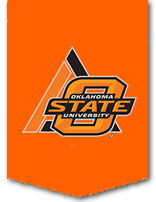Improving global food safety from farm to fork
By Mandy Gross, FAPC Communications Services Manager
(STILLWATER, Okla. – March 24, 2016) – Roughly one out of six Americans or 48 million people gets sick each year because of foodborne illness. In addition, 128,000 are hospitalized and 3,000 die from foodborne diseases annually.
Oklahoma State University faculty and staff understand the need for proper food handling from farm to fork nationwide and is becoming a leader in global food safety.
With the sponsorship of Unitherm Food Systems of Bristow, Oklahoma, Jason Young, quality management specialist for OSU’s Robert M. Kerr Food & Agricultural Products Center, joined experts from around the world in Düsseldorf, Germany, Sept. 15-16, 2015, and in Berlin, Germany, March 1-4, 2016, to tackle global issues faced by the food industry.
“It is an honor to be able to work with food safety experts worldwide and discuss how we can make our food even safer than it already is,” Young said. “Each and everyone who attend these conferences are dedicated to improving food safety on a global scale.”
Driving Advancement in Food Safety
The Global Food Safety Initiative, which strives for continuous improvement of food-safety management systems to ensure safe food and consumer confidence, drives specialized advancement through its Technical Working Groups.
These groups are composed of experts drawn from retailers, manufacturers, food service operators, service providers, standard owners, certification bodies, accreditation bodies and industry associations.
They provide technical expertise and advice to the GFSI Board, work independently throughout the year on a range of food safety topics, and come together three times a year to share knowledge and discuss their work.
According to www.mygfsi.com, “The work of GFSI would not have moved forward in the way that it has over the years without the dedication of GFSI Technical Working Group experts and the support of the companies they represent.”
Young, the only attendee from Oklahoma, is a member of the GFSI Technical Working Group for Regional Outreach. The purpose of this group is to provide advice to the GFSI Board to develop a strategy, action plans and shared tools to support global expansion during the next five years.
Young said the group would meet many times during the next two years.
“We learned how the current local groups operate,” he said. “Part of our objective is to help GFSI establish an application process to form new regional groups. Additionally, we want to construct a method for the groups to be sustainable and directed by a local team with support from GFSI.”
Since the creation of the Technical Working Groups, more than 100 companies, consultancies and organizations have collaborated in 25 teams, covering all areas of food safety.
Véronique Discours-Buhot, director of the Global Food Safety Initiative and The Consumer Goods Forum, said food safety is a shared responsibility.
“With the food supply chain growing more and more complex, no one can do it alone,” she said. “We are thrilled to bring together the entire industry spectrum – manufacturers, retailers and service providers but also international organizations, academia and government representatives – to collaborate on key food safety issues. Above all, the Technical Working Groups are a fantastic example of collaboration.”
Young said what makes GFSI so unique is that it engages in a two-way dialogue with the food industry.
Stakeholders bring perceived concerns and issues to the table, and food-industry leaders communicate those challenges to the GFSI Board, who then mandate working groups to collaborate on global issues and find solutions to industry concerns. Solutions and best practices are made available to the industry to drive continuous improvement.
Serving Oklahoma’s Food Industry
With a growing demand for safe quality food products, the need for food-industry companies to engage in food-safety programs is more important than ever.
Professionals within FAPC, a part of OSU’s Division of Agricultural Sciences and Natural Resources, recognized this need and embraced this opportunity.
With the support of Oklahoma’s food-industry leaders and FAPC’s Industry Advisory Committee, center faculty and staff implemented a Global Food Safety System program to assist Oklahoma food companies in meeting GFSI needs.
This program focuses on food-industry assistance in the areas of training, auditing, pre-third-party audit preparations, education, and in-plant technical assistance for food safety and quality programs.
Young has filled this need to provide food-safety assistance. One of the major ways he helps food companies is by conducting internal audits.
“Globalization of the food industry has significantly affected almost every Oklahoma food processor directly and indirectly with mandated food-safety and security regulations and policies that cut across all food-processing sectors,” said Chuck Willoughby, FAPC manager of business and marketing relations. “Our FAPC Global Food Safety System program provides services to meet the food-safety and security needs of Oklahoma’s food industry.”
Since the establishment of the program in 2011, Young has assisted 12 companies, providing more than 600 hours of GFSI services. With Young’s help, nine of these companies have passed their GFSI audits.
“There are several audit schemes such as Safe Quality Food and BRC Global, which are designed to meet GFSI,” Young said. “I am able to meet with the company and conduct an internal audit. We work to identify any gaps within the company’s food-safety and quality system, and these gaps are further discussed to identify ways to meet the criteria.”
FAPC’s program is continually growing, leading to fewer food-safety incidents with the implementation of these schemes.
- ### -
Oklahoma State University is a modern land-grant university that prepares students for success. OSU has more than 36,000 students across its five-campus system and more than 25,000 on its combined Stillwater and Tulsa campuses, with students from all 50 states and around 120 nations. Established in 1890, Oklahoma State has graduated more than 260,000 students who have been serving Oklahoma and the world for 125 years.

